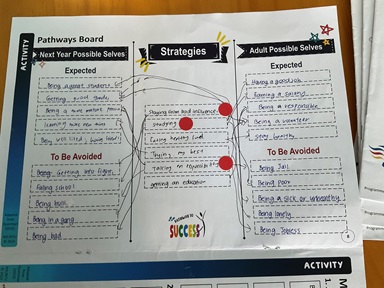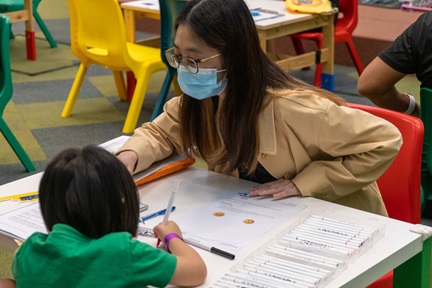Unpacking Nonlinear Pedagogy: A New Path for PE Teachers
OER 16/21 CJY - An Investigation on PE Teachers’ Understanding and Enactment of Nonlinear Pedagogy
Teachers have some knowledge about the ‘what’ and ‘why’ of NLP but are less familiar with the ‘how’ (enactment) of NLP in their lessons. A hybrid intervention programme that allows the teachers to be more self-directed in their learning can help to advance their knowledge and practice on NLP in their lessons. The findings from the programme of work have provided the impetus to infuse content about NLP knowledge and application in the PE Syllabus as a pedagogical approach. Professional development intervention should be designed to include a hybrid format. Importantly, there should be more effort to encourage co-designing of professional development learning with the teachers involved to support their professional growth in NLP.
Project Team
PI: Associate Professor Chow Jia Yi, TEUP & PESS, NIE
Co-PI: Assistant Professor John Komar, PESS, NIE
Collaborators:
Dr Lee Shu Shing, CRPP, NIE
Mr Benjamin Tan Su-Jim, AST, MOE
Mr Irfan Bin Ismail, AST, MOE
Professor Chris Button, University of Otago
Professor Ludovic Seifert, University of Rouen
Mr Jonathan Ng, Royal Melbourne Institute of Technology University
Mr Loh Huai Kai, PESS, NIE
Project Description
Nonlinear Pedagogy, underpinned by Ecological Dynamics, have provided new knowledge to enhance teaching by considering how teachers can encourage exploration and adaptation for students to find individualized ways to solve movement challenges. However, to our knowledge, there is still a significant number of PE teachers who are not familiar with NLP even though some may have heard about NLP.
There is thus a need to: i) determine PE teachers’ current understanding of NLP and ii) determine the effectiveness of a comprehensive intervention programme that is relevant in enhancing the PE teachers’ knowledge and enactment of NLP in the schools.
Using a mixed model approach via online survey, it was found that the participants (100 primary and 100 secondary PE teachers) are familiar with the knowledge aspect of NLP but are less familiar with the enactment of NLP in their lessons. 37 participants involved in the 4 weeks intervention phase of the study reported an increase in the knowledge and enactment of NLP post intervention. From lesson observations, the participants demonstrated greater use of NLP design principles.
Findings highlighted teachers’ interest in NLP and the effectiveness of a hybrid intervention programme to enhance professional development in NLP.
Project Implications
Findings from this study highlighted the relevance of Nonlinear Pedagogy and how teachers are keen to know more about this pedagogical approach. A carefully designed intervention programme on Nonlinear Pedagogy that provides a safe space for PE teachers can encourage the enhancement of knowledge and enactment of Nonlinear Pedagogy in their pedagogical practice.
- There should be greater focus on sharing how Nonlinear Pedagogy can be enacted during professional development using practical exercises and observation that focuses on experiential learning and task designing.
- Carefully designed professional development programmes with regular access to expert consultation, safe space for discussion and tailored resources positively impacts both learning and enactment of Nonlinear Pedagogy.
- Longer duration empirical investigation should be undertaken in the future to further examine the impact of such professional development initiatives to support the uptake of innovative pedagogical approaches.
Resources
Selected Talks
- Nonlinear Pedagogy Explainer: https://youtu.be/XdjF7axeNLo?si=VFDPOeRj842PfZKs
- Interview with Jia Yi Chow, NTU Singapore, Nonlinear Pedagogy (Perception Action Podcast): https://youtu.be/vfI0qkYMAKA?si=AovsLXpn5WG7JBPp
- What the hell is Nonlinear Pedagogy (Ecological Dynamics of Skill); https://www.youtube.com/live/k-GdHhcXu3c?si=tGiSnfHp_PV-wIdf
Featured in the Press
Selected Articles
- Chow, J. Y., Button, C., Lee, M. C. Y., Morris, C., & Shuttleworth, R. (2023). Advice from 'pracademics' of how to apply Ecological Dynamics Theory to practice design. Frontiers in Sports and Active Living, 5, 1192332.
- Chow, J. Y., Meerhoff, L. A., Choo, C. Z. Y., Button, C., & Tan, B. S-J. (2023). The effect of Nonlinear Pedagogy on the acquisition of game skills in a territorial game. Frontiers in Psychology, 14, 278.
- Chow, J. Y., Komar, J., Davids, K., & Tan, C. W. K. (2021). Nonlinear Pedagogy and its implications for practice in the Singapore PE context. Physical Education and Sport Pedagogy, 26(3), 230-241.






.tmb-listing.jpg?Culture=en&sfvrsn=b0306905_1)